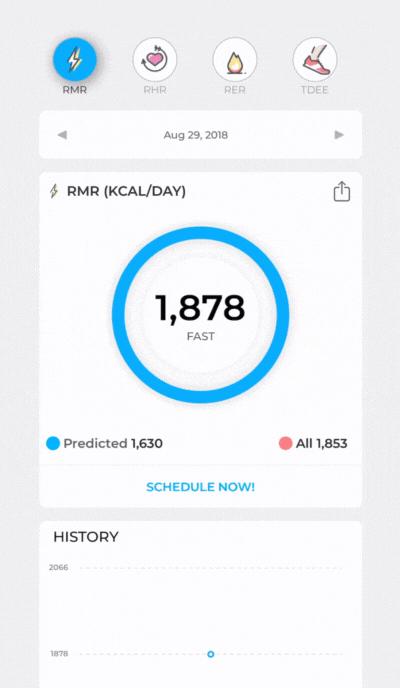RMR TEST IN NORTH JERSEY
Reveal the Secrets of your metabolism
Ever dream of managing your weight effortlessly or optimizing your diet? The DexaFit RMR test is your secret weapon. Discover the power of personalized nutrition for a life brimming with energy and balance.
Precision nutrition with DexaFit
Unlock the mystery of your body's energy needs with the DexaFit RMR Test. More than just numbers, it's your personalized roadmap to nutritional success.
Caloric Clarity: Accurately determine your daily energy requirements for a science-backed diet..
Health in Numbers: Pin down your caloric needs to dodge the pitfalls of over or undereating.
Nutritional Power: Use RMR to fine-tune your diet for optimal energy utilization.
Insightful Health Tracking: Monitor metabolic changes over time to adapt your diet and lifestyle accordingly.

Unraveling the mystery of your metabolism
Gone are the days when RMR testing was a secret weapon of exclusive health circles. Today, it's your personal compass in the complex world of metabolic health, accessible and revealing.
Fueling Your Life's Journey
RMR testing isn’t just a health check; it’s a deep dive into your body’s energy universe. It empowers you to sculpt a nutrition strategy that's perfectly in sync with your metabolic rhythm, fueling every step of your day-to-day life.
Your Nutrition, Optimized
RMR isn't just about weight. It's about unlocking the full potential of your health and vitality. Knowledge of your resting metabolic rate is power – the power to fuel your life with precision.
Get DexaFit in 3 easy steps
Step 1: Comfortable setup
We'll begin by ensuring you're comfortably seated or lying down, preparing you for the RMR test without any physical exertion.
Step 2: Relax and measure
Our system efficiently measures your RMR, the speed of your metabolism.
Step 3: Key insights
Post-test, you'll get an insightful breakdown of your metabolism, revealing key insights into your metabolic health.

FAQs
If you want to further reduce your risk of Alzheimer’s disease, cancer, atherosclerosis… you must be the most metabolically flexible, metabolically healthy person imaginable.
— Dr. Peter Attia,
author of Outlive: The Science and Art of Longevity
-
RMR testing gauges your Resting Metabolic Rate, revealing the calories burned at rest. It's a fundamental indicator of metabolic health, providing crucial insights into how your body utilizes energy during periods of inactivity. This measurement supports vital functions like breathing, blood circulation, and cellular repair.
Our test will differ and measure your TDEE without exercise. This is because we can not accurately measure ONLY the metabolic rate in a commercial setting.
-
Embarking on an RMR test is like decoding your body's energy playbook. It reveals your Resting Metabolic Rate, the baseline energy your body uses for essential functions like breathing and circulating blood.
Diving deeper, the test sheds light on your Total Daily Energy Expenditure (TDEE) – a comprehensive measure encompassing not just your RMR, but also the energy expended through physical activity and workouts. TDEE even factors in the subtle yet significant energy used in everyday non-exercise movements, known as Non-Exercise Activity Thermogenesis (NEAT). NEAT includes all the small activities you do throughout the day – walking, typing, even fidgeting – that collectively contribute to your daily calorie burn. Understanding TDEE is crucial, as it represents the total number of calories you expend daily, guiding you to make informed decisions about your diet and exercise for optimal health and wellness.
-
Please fast for a minimum of five hours and limit physical activity to ensure your body is in a true resting state. Avoid caffeine and stimulants to prevent any alterations in your metabolic rate.
-
DexaFit's RMR test is significantly more accurate than formula-based estimates, which can be off by 30-40%. It's like using a high-precision measuring tool versus a rough estimate, ensuring you get an accurate understanding of your metabolic health.
-
By understanding your RMR, you can more effectively tailor your diet and exercise plans. It's a critical component in breaking through weight loss plateaus or efficiently building lean mass.







